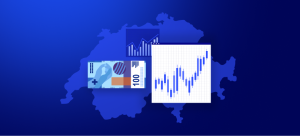The Swiss Franc (CHF) has traditionally been considered one of the world’s most reliable and stable currencies, acting as a safe haven for investors in times of economic and geopolitical instability. Its stability is due to several key factors inherent to Switzerland and its economic policies.
Reasons for the Stability of the Swiss Franc:
1. Political neutrality and stability
Switzerland is known for its long-term policy of neutrality, which allows it to avoid involvement in international conflicts. Switzerland has not been involved in a war since 1815, and its long-standing policy of neutrality has made it a beacon of stability in a world often fraught with conflict. This neutrality extends to its financial system, which is perceived as a safe harbor for capital during turbulent times.
2. The strong and diversified economy
Switzerland has a strong industrial sector known for producing high-quality products, including electrical equipment, pharmaceuticals, and financial services. The economy’s diversification reduces dependence on external factors and contributes to the stability of the national currency.
3. Low inflation
Switzerland has historically maintained a low inflation rate, which helps preserve the franc’s purchasing power and boosts investor confidence. A strong franc lowers the cost of imported goods and services, especially oil and natural gas, which helps keep domestic inflation in check.
4. Conservative SNB monetary policy.
The Swiss National Bank (SNB) pursues a policy of low inflation and stable interest rates, strengthening confidence in the franc. The regulator strives to keep the average annual inflation rate lower than in other countries, contributing to the currency’s long-term stability.
5. Developed financial sector
It is no secret that the Swiss banking sector is considered one of the most reliable in the world. Due to what:
- Tight regulation and strict capital requirements (By maintaining high levels of capital and liquidity, Swiss banks remain resilient even in times of crisis. Even after Credit Suisse’s bankruptcy in 2023, Switzerland was able to stabilize quickly thanks to support from the government and the SNB).
- Developed financial infrastructure (Switzerland has a modern financial system and access to the world’s leading markets).
- High level of trust (The country guarantees deposits up to CHF 100,000, which increases customer confidence).
- There is a wide diversification of banking activities (Banks develop wealth management and investment services widely). The country is also a center for investment fund management and private equity.
- Confidentiality and bank secrecy (Historically, Swiss banks have been known for strict bank secrecy laws. Although since 2017 Switzerland has joined the international standard of Automatic Exchange of Tax Information (AEOI), the level of confidentiality remains higher than in many other countries).
Impact of Geopolitical Risks and Tariff Uncertainty
With Donald Trump’s re-election for a second term in 2024 and his plans to raise tariffs on imported goods, including products from China, concerns have arisen about the possible impact of these measures on the global economy and on Switzerland in particular. The US is Switzerland’s largest export market, accounting for around 20% of Swiss exports. An increase in tariffs could have a negative impact on the Swiss economy, which is a concern for the State Secretariat for Economic Affairs (SECO).
However, despite these external risks, the Swiss franc will likely remain stable. Historically, the franc has strengthened during global uncertainty as investors seek safe-haven assets. Even if the Swiss economy struggles due to new tariffs, global demand for the franc as a “safe-haven currency” could offset these negative effects, keeping it stable. Swiss National Bank Chairman Martin Schlegel noted that the franc will likely remain a safe haven for investors in times of uncertainty, and the country is well prepared for these challenges.
Other Safe-Haven Currencies
In addition to the Swiss franc, there are other currencies that investors are considering as safe-havens:
-
The US dollar (USD)
Despite domestic economic problems, the US dollar remains the world’s main reserve currency. In times of crisis, investors often move funds into dollar-denominated assets such as US government bonds.
-
Japanese Yen (JPY)
The yen is considered one of the most reliable currencies in Asia, largely due to the country’s high savings rate and the stability of the Japanese economy. During periods of market turbulence, investors traditionally buy the yen.
-
Euro (EUR)
Although the Eurozone faces domestic economic and political challenges, the EUR remains the world’s second most important reserve currency and is considered a relatively safe-haven asset during periods of uncertainty.
-
Singapore Dollar (SGD)
Due to its stable economy and strict financial regulations, the Singapore dollar attracts investors, especially in Asia.
-
Norwegian Krona (NOK)
Norway has a stable economy, low government debt, and significant natural resource reserves, which makes its currency attractive in times of instability.
Final Word
Many investors are looking for different safe-haven currencies to preserve their capital. The Swiss Franc is deservedly considered a top safe haven due to its combination of political stability, a strong economy, conservative monetary policy, and a developed financial sector. Although geopolitical risks and tariff uncertainty related to US policy may pressure the Swiss economy, the franc’s historical resilience and attractiveness to investors suggest that its stability will continue in the future. At the same time, investors may consider other safe-haven currencies such as the US dollar, Japanese yen, euro, Singapore dollar, and Norwegian krone to diversify their holdings in the face of global uncertainty.

